Staff In Memoriam
Remembering Billie Harris
Billie Harris (March 27, 1932 – April 8, 2022)
Billie Harris, beloved local radio broadcaster and actress, and HistCon department manager extraordinaire died aged 90 after a series of strokes.
Billie was born in London, England. Despite beginning her life enduring the Depression and the German bombings of WWII, she always described her early years as pleasant, with a baby brother to care for, piano and elocution lessons, and opportunities to pose as a children’s clothing model for newspaper advertisements. She attended the prestigious North London Collegiate School for Girls, where she excelled in languages and theater. She married in her early 20s and moved with her husband to California. 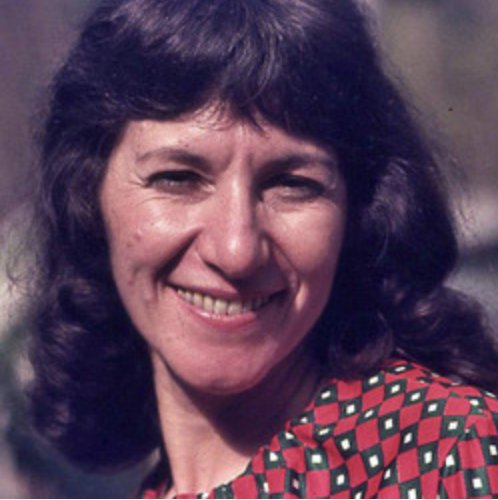
In 1967 they moved to Santa Cruz with their two young sons. Aubrey worked at the recently opened UCSC campus and directed the university’s instructional television program. Billie starred in many local theater productions, including The Cherry Orchard, The Lion in Winter, Cat on a Hot Tin Roof, Sweet Bird of Youth, Separate Tables, Misalliance, Arms and the Man, Charley’s Aunt, The Importance of Being Earnest, and other works. She also joined Shakespeare Santa Cruz, appearing in Richard II and Henry IV. She was prized by directors and praised by audiences for her crisp, British accent and her expressive vocal range. She also brought her acting skills to annual recitations from the Book of Jonah at Temple Beth El’s Yom Kippur services.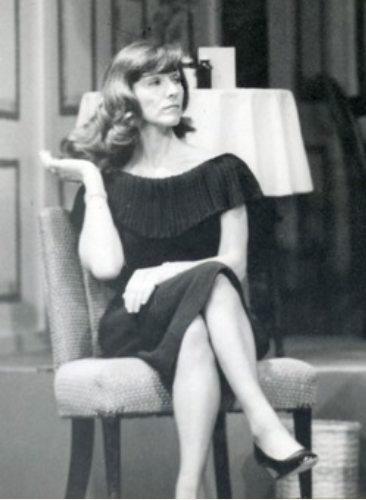
In the early 1970’s she began work at UCSC in administrative support roles, eventually becoming the program director for the History of Consciousness graduate program, where she remained until her retirement in 1992. Through her work at UCSC, Billie attracted a wide circle of devoted friends, including professors, staff, and students. She enjoyed hosting large parties in her home on Calvin Place in University Terrace, where she entertained guests with dirty limericks and rousing sing-alongs around the piano. She always made sure to invite UCSC students who were far from home and needed a sense of family.
In 1976, she accepted an invitation from station KUSP to participate in a Saturday morning children’s radio program, called Saturday’s Child. She modeled her portion of the program after a BBC radio show she had listened to as a child in England, called Listen with Mother, which featured a gentle-voiced woman reading children’s books. In homage to that show, Billie always began her readings by asking her radio audience, “Are you sitting comfortably?... Good. Then I’ll begin…” She brought to life a variety of books over the years, tending to favor classics such as Charlotte’s Web, The Wind in the Willows, C.S. Lewis’s Narnia series, and Alice in Wonderland; she also read each new Harry Potter book as soon as it was published. She was always delighted to encounter listeners young and old in the community who would recognize her voice and stop her on the street to ask, “Are you, Billie Harris?” In the 1990s, she added a second program, From the Bookshelf, in which she would interview local authors about their newest publications. She remained on the air at KUSP until 2004 when Billie moved to the East Bay to be closer to her grandchildren.
She returned to Santa Cruz in 2017 and shortly thereafter resumed her weekly radio show reading children’s books again on the new local station, KSQD. Even when neuropathy robbed her of her ability to walk, she was determined to continue the show, making recordings in her apartment at Dominican Oaks and emailing them to the radio station for weekly broadcasts. Her last show (halfway through The Lion, the Witch, and the Wardrobe) was broadcast four months before her death.
In 1986, shortly after undergoing surgery for cancer, in an essay about her experience, she wrote, “I don't think anything matters except trying to be as good as I can in my own personal way of what ‘good’ means, which has very little to do with holiness, but rather more a question of being kind whenever I can, and doing my best not to hurt anyone if I can possibly help it.”
Billie was a model of the power of unconditional love, making life-long friends wherever she went, charming them all with her easy smile, and addressing them as “Darling.” She spent her final weeks surrounded by family and dozens of friends, full of gratitude for her life and for having had “so many wonderful people to love.”
She is survived by her sons, Stephen and Clifford, her daughters-in-law, Karyn and Gilliann, and her grandsons, Emilio and Nicco.
Faculty In Memoriam
Professor Hayden White, (Doctor of Philosophy in History, University of Michigan), former Chair and Professor of the Department of the History of Consciousness
Tribute by James Clifford, Distiguished Professor Emeritus
Tribute by Susan Leigh Foster, Distinguished Professor at UCLA
Remembrances Page
New York Times obituary
Santa Cruz Sentinel obituary

Remembering Hayden White
James Clifford
Temple Beth El, Santa Cruz, CA
March 9th 2018
I was Hayden’s junior sidekick in 1978 when we both arrived in Santa Cruz as the History of Consciousness Board’s first full-time faculty. The campus was in the midst of radical reorganization, and the program suffered from problems of continuity and faculty commitment. Histcon was anarchic in both bad and good ways—the good ways having to do with its extraordinary students: idealistic, original, unwilling to bow to authority. As the new Chairperson, Hayden brought essential stability and a fresh vision. There were widespread fears that he would initiate a reign of “high theory” and academic professionalism. But he didn’t impose an orthodoxy or a required curhriculum, and it was soon apparent that he valued the unruly multiplicity of Histcon.
He resisted pressure to come up with a less outrageous name. And he adopted as departmental logo… the sphynx.
Hayden understood that a program like Histcon had to be open and experimental. It could not be disciplined, from above. It would be composed of the always-changing interests of its members, held together by intellectual passion and human connections. “Loyalty to people,” he used to say, “not to institutions.”
Of course, by then he was a world-renowned scholar and critic. I won't try to sum up his many contributions to understanding historical thought and practice. As an intellectual, he characteristically combined radical openness with intellectual rigor (“anarcho-formalism” I used to call it). This attitude was exactly what a program like Histcon required. We needed to let a hundred flowers bloom without sliding into “anything goes” relativism. Good intellectual work, Hayden knew, could take many forms. There was no sovereign theory or inherently virtuous approach.
Around 1980, when our dynamic Dean, Helene Moglen, offered Histcon two senior positions, but only if they were feminist scholars, Hayden said “why not?” Feminist theory had not been a part of his own thinking. But he recognized an emerging field with exciting possibilities.
This openness was evident in Hayden’s academic advising. He directed dissertations from all over the intellectual and political map. To mention only a few from the early years: Sharon Traweek was doing fieldwork among Physicists. Susan Foster disentangled the forms of dance. Jose Rabasa did close readings of 16th Century conquest narratives in Mexico. Chela Sandoval explored “oppositional consciousness” in contemporary Third World Feminism.
Hayden seemed interested in everything and (intimidating to a younger colleague) to have read everything! The only qualities he couldn't stand were literal mindedness and sanctimoniousness.
He knew how to provoke. I’ll never forget the stunned silence that greeted his advice to our first pro-seminar in 1978. “In our line of work,” he informed the students, “You have to love reading more than anything—more than food, more than politics, more than sex…”
Our late colleague Jack Schaar introduced Histcon’s new Chair to the campus newspaper: “Hayden White is a man who likes to walk up to an idea…and punch it in the nose.”
Working with Hayden (and this went for faculty as well as students) wasn’t always comfortable. He would step on what you held sacred. And he could be wickedly accurate. But we discovered that If you stayed with him, stayed in the conversation (and he so loved conversation), he would do anything for you. Watching him work with students, I was always amazed by how much he took on, how generous he could be. An incredible energy…
And if he wasn’t always gentle, he was exciting. What an oral performer he was!
Hayden had a special magic: often after a conversation with him you would come away inspired, feeling better about yourself. I still don’t know how he did it. Maybe it was just his way of taking your confused contribution to the life of the mind seriously.
Looking back, I’m most grateful for the freedom and the security I found in Hayden’s Histcon. Permission to thrive. (I’ve heard Donna say much the same thing.) It was a place where we were free from disciplinary conservatism. We could experiment and take risks.
For forty years, Hayden would be a model of deep collegiality and, with Margaret, a true friend. When Judith and I looked for someone to marry us in our Westside backyard Hayden was the obvious choice. Wearing a white, three-piece suit, he rose to the occasion magnificently, and without a trace of irony.
His was an amazing energy--a kind of life-force that swept up those around him.
It’s hard to accept that this energy is now gone. But we all take some of it with us, and if we follow Hayden’s example, we’ll find ways to pass it on.
For Hayden White’s Memorial
Susan Leigh Foster, Distinguished Professor of Dance, UCLA
PhD – History of Consciousness, 1981
The first thing I want to say about Hayden is that he was an absolutely fabulous dancer. He was articulate, enormously sophisticated in terms of rhythmic phrasing, and he could throw weight into his lanky frame, so as to bust one move after another. His dancing was super sexy. This needs to be said.
When Hayden came to History of Consciousness as its first Chair, he inherited a wild assortment of students who were largely running the program themselves. The only thing he had going for him in terms of infrastructural support was the illustrious voice of Billie Harris who answered the phone every time --- “History of Consciousness.” How could that not be credible?
Hayden proceeded to establish many other and more far-reaching reasons to believe in the program, what it might represent and achieve. He set about constructing an atmosphere of curiosity, generosity, and openness towards all kinds of inquiries. He offered students an entirely new way to discuss their projects with one another and to forge interdisciplinary connections by focusing on how different theoretical frameworks and methodological approaches could illuminate their individual research interests. He invited numerous guest speakers whose presentations served as a forum for further discussion and community building.
Together with Margaret, he created a warm and welcoming environment for the students, hosting many parties and receptions, always with good food and “liquid methodology.” And all of this while also writing “The Value of Narrativity in the Representation of Reality”, among other essays.
Hayden was an enthusiastic and willing listener, and he was always up for a discussion. He was endlessly inventive in terms of responses to students’ work; he borrowed with gusto ideas or whole frameworks for analysis from one disciplinary inquiry and transplanted them into another in order to see what they might reveal, and he dazzled with his capacity to represent succinctly the positions of any European or American philosopher and theoretician. “Deconstruction,” he once said, “is the process of taking something apart carefully in order to see how it works.”
Throughout he cast strong light on the structurings of power, giving voice to the underdog, the marginalized, and that which had been suppressed, oppressed or occluded. In accepting his honorary doctoral degree from the Frei Universitaet in 2016, he reminisced about his earliest years as a student, revealing to the packed auditorium that as a first-grader he had been smitten by the sweet smell of the teacher and resolved then and there that if reading books could improve the smell of his surroundings then that is what he would do.
Hayden adhered to a politics of sharing, once off-handedly observing in a comment that I share with every student: “If you hold onto an idea, you’ll never have another; if you give ideas away, you’ll always have more.”
Returning to Hayden’s “bodily” passions – besides dancing he also loved to cook and to eat. It was my great good fortune to tour northern Italy with Hayden, Margaret, and Juliana, and as yet another aspect of the education I received from him, watched with astonishment as he looked up every one fork, two star Michelin ranked restaurant in the region and then organized a tour of cultural sites that would fit in with these dining options.
I have been in touch with so many scholars around the world since Hayden’s passing who are all reading and re-reading his texts as a way to celebrate his life. We are so lucky to have known him in many more ways as well.
Professor Doctor Gary Lease (Doctor of Theology, University of Munich), former Chair and Professor of the Department of the History of Consciousness
UC Santa Cruz Obituary
Alumni In Memoriam
Remembering John McFadden
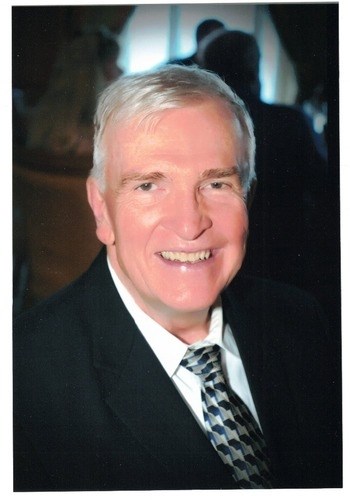 “John Patrick McFadden, 85, passed away at home in Sacramento, California, surrounded by his family, on September 12, 2022.
“John Patrick McFadden, 85, passed away at home in Sacramento, California, surrounded by his family, on September 12, 2022.
He is survived by his wife of 38 years, Karen Thomas, daughters Elena McFadden and Sara McLachlan, son, Tom McFadden (Mary Ellen), and grandchildren Rose, Riley, Julia, and Bennett. He was preceded in death by his parents, John "Mack" McFadden and Helen Whitenack McFadden, and his brother Joseph Edward McFadden.
John was born on December 21, 1936 in Martinez, California, where his father worked for Allied Oil. The family also lived in Woodburn, Oregon and Altadena, California. When his father had to stop working because of osteomyelitis, his mother supported the family as a registered nurse.
For twelve years John attended the Roman Catholic Junior Seminary, Queen of Angels Seminary, and St. John's College in Camarillo, forming many lifelong friendships. He was ordained a Roman Catholic Priest in l963 and served parishes in Claremont and Pasadena, California and in Cuernavaca, Mexico.
John took a leave of absence from the priesthood in 1967 and married Georgia Lyga in l968. That year he began a PhD program in the History of Consciousness at University of California at Santa Cruz. After completing his coursework in 1970, John and Georgia went to work with the United FarmWorkers inDelano, California. Elena Odile was born in 1972 and Sara Karen in l973.
In 1974 the family moved to Sacramento where John began teaching in the Education Department at California State University Sacramento. He received his PhD from UCSC in December 1975.
In July 1979, after the Sandinista Revolution, John took a leave of absence from CSUS to move to Nicaragua for two years to be part of the teacher training program for the National Literacy Campaign. He was accompanied by Georgia, Elena, and Sara.
In August, l981, the McFaddens returned to Sacramento and John continued teaching teachers at CSUS in the Department of Bilingual/Multicultural Education until his retirement in 2005.
John's second marriage to Karen Thomas took place in September, l984. Their son Tom was born in l986.
John was an intrepid traveler and went with friends and family members to every continent except Antarctica. His journeys included trips to Peru, India, France, Bali, China, Singapore, Laos, Cambodia, Norway, Chile, South Africa, Spain, Portugal, and Ireland.”
Remembering Teresia Teaiwa
By Jim Clifford, Professor Emeritus History of Conciousness
Teresia Teaiwa, History of Consciousness PhD 2001, passed away on 21 March 2017. The cause was pancreatic cancer. Her untimely loss has devastated many friends and admirers. An enormous outpouring of love and support, from throughout Oceania and beyond, accompanied her final weeks. Her husband, Sean Mallon, and two sons, Manoa and Vaitoa, were with her in her last days.
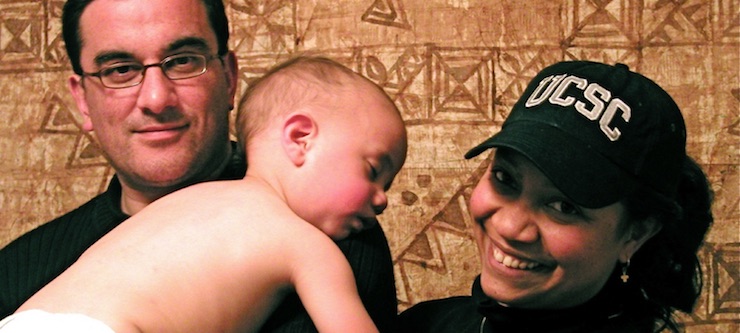 Sean, Vaitoa, Teresia: Wellington, 2003.
Sean, Vaitoa, Teresia: Wellington, 2003.
Teresia was a prominent educator, academic innovator, and poet. .She directed the Va‘aomanū Pasifika unit (Pacific Studies and Samoan Studies) at Victoria University in Wellington, Aotearoa-New Zealand, the first and only program to offer a Ph.D. in Pacific Studies. (In this path-breaking project she has collaborated closely with April Henderson, History of Consciousness PhD 2007.)
Born in Honolulu and raised in Fiji, Teresia taught at the University of the South Pacific in Suva before moving to Wellington. Deeply concerned with Fijian culture and politics after a series of military coups, she strongly rejected all forms of ethnic absolutism. Her view of the world reflected a Pacific-centered internationalism. Her father is I-Kiribati (displaced to Fiji from the mine-devastated phosphate island of Banaba), and her mother African American. An understanding of the simultaneously rooted and mobile nature of islander histories and attachments permeated her scholarship, teaching, and creative writing.
An anti-nuclear activist, defender of West Papuan independence, and a critic of militarism, Teresia sustained many alliances and was a widely influential voice. She received prestigious academic fellowships and multiple teaching awards. Her poetry is widely published and appreciated.
A compendium of open access works can be found at:
https://savageminds.org/2017/03/21/remembering-teresia-teaiwa-an-open-access-bibliography/
As a student in History of Consciousness Teresia played a central role in the diversification of feminism through the Research Cluster for the Study of Women of Color in Collaboration and Conflict. She co-edited its important publication, Enunciating our Terms, for the Center for Cultural Studies journal, Inscriptions.
Teresia’s dissertation, "Militarism, Tourism and the Native: Articulations in Oceania". rescued “the Native” from the simplifications of pastoral exoticism, nationalist apologetics, and postmodern condescension. It was an entirely original revision of the history and image of indigenous peoples in the light of experiences of travel and global entanglement. In this and subsequent writing, Teresia built on the work of Epeli Hau’ofa, reconceiving the Pacific from the inside out. The region had long been oversimplified by Western exoticisms and in more recent military and touristic projections. Teresia refigured Oceania as a dynamic space, a native “cosmopolitanism.” She explored how customary patterns of dwelling and traveling were being rearticulated in contemporary national and international contexts. Her approach to the lived “cultures of militarism and tourism” has been particularly important, probing specific personal investments and complex relations of power and reciprocity.
As chair of Teresia’s thesis committee (the other members were Angela Davis and Barbara Epstein), I learned enormously from her insights, gentle prodding, and sense of humor. Her “style” was something unique. Teresia had charisma. At conferences she could address the most difficult points with political and analytic rigor, but always with a lightness of touch and a conversational eloquence that invited discussion.
If you would like to hear her voice I recommend:
https://www.youtube.com/watch?v=lipupbIZb6U
On her extraordinary Pacific-centered teaching:
https://akoaotearoa.ac.nz/mi/node/11225
And a good sample of her irreverent, loving manner can be found at:
https://muse.jhu.edu/article/372572
For an overview of her book-in-progress, a complexly gendered analysis of the cultures of militarism:
http://intersections.anu.edu.au/issue37/teaiwa.htm
We hope that as much of this work as possible can be edited and published before long.
A couple of weeks before she died, Teresia somehow found the energy to respond to a haiku by Matsuo Basho I had sent.
Wrapping dumplings in
bamboo leaves, with one finger
she tidies her hair
“Reminds me of the way my nurses balance blood taking with one hand, sometimes one finger…!”
Everyone who was touched by Teresia’s attentiveness, brilliance and grace will miss her immeasurably.
Remembering Nathalie Magnan
HistCon mourns the death of former graduate student, Nathalie Magnan,1956-2016. Working with Teresa deLauretis, Donna Haraway, Helene Moglen, Jim Clifford, and others, Nathalie studied in Hist Con from 1985 to 1990. She forged and maintained strong ties with fellow HistCon students over many years. Before coming to HistCon, Nathalie already had an impressive corpus of video productions and a MFA from the Rochester Visual Studies Workshop of SUNY Buffalo. Nathalie taught at Paris VIII, l’Ecole supérieure des beaux arts de Dijon, and finally l’École nationale supérieure d’art de Bourges. She was an innovator in radical participatory visual media; a formative thinker in cyber-feminism; a leader in queer, feminist, and lesbian theory; a feisty and beloved dyke; and an inspiration for young media activists in anglophone and francophone worlds. She worked with DeeDee Hallek in Paper Tiger Television, helped found both the Los Angeles Gay and Lesbian Film Festival and the Gay and Lesbian Film Festival in Paris, and was an innovator in digital queer media. Pleasure, play, justice, and power infused her work. She was passionately opposed to anti-Muslim racism in the 18th arrondissement, where she lived for several years. Nathalie assured the translation and publication in France of Donna Haraway, Manifeste cyborg et autre essais, science-fiction-féminisme Paris, éditions Exils (2007). Nathalie returned to Santa Cruz for the HistCon reunion in June 2011, where the group photo below was taken. Nathalie’s last public work was at "Blackmarket for Useful Knowledge and Non-Knowledge No. 18: On Becoming Earthlings” in Paris at the Musée de l’Homme in November 2015. In recent times Nathalie lived in Marseille with her partner of many years, Reine Prat, who along with Catherine Lord, was with her when she died on October 15, 2016.
Remembering Marcos Becquer
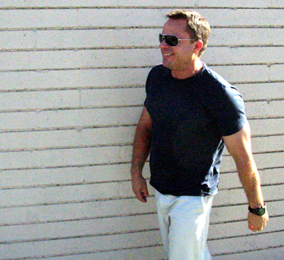 On May 16, 2011, History of Consciousness graduate student Marcos Becquer died in Boynton Beach, Florida. Born in Jatibonico, Cuba, on October 26, 1965, Marcos was a very special member of the HistCon world, and he is deeply mourned by friends, colleagues, and family. Marcos had a vivid warmth, generous presence, astute mind, and layered sense of humor—online, in person, and in writing. His extraordinary intellectual talent was evident in nuanced scholarship and superb writing in film and visual studies, performance theory, theories of sexuality, philosophy, and critical cultural studies across categories of difference. Coming to History of Consciousness in 2003, Marcos moved to Miami in 2008 to continue his doctoral studies in the midst of the demands of making a living in destructive economic, social, and corporeal times. In Miami he was also close to family, especially his sister Marci Ramos, who supported him in every way. In losing Marcos, we mourn a vital person with a rare intelligence; he risked asking questions close to the heart and rooted in the marrow of the problems of living and dying well in contemporary worlds.
On May 16, 2011, History of Consciousness graduate student Marcos Becquer died in Boynton Beach, Florida. Born in Jatibonico, Cuba, on October 26, 1965, Marcos was a very special member of the HistCon world, and he is deeply mourned by friends, colleagues, and family. Marcos had a vivid warmth, generous presence, astute mind, and layered sense of humor—online, in person, and in writing. His extraordinary intellectual talent was evident in nuanced scholarship and superb writing in film and visual studies, performance theory, theories of sexuality, philosophy, and critical cultural studies across categories of difference. Coming to History of Consciousness in 2003, Marcos moved to Miami in 2008 to continue his doctoral studies in the midst of the demands of making a living in destructive economic, social, and corporeal times. In Miami he was also close to family, especially his sister Marci Ramos, who supported him in every way. In losing Marcos, we mourn a vital person with a rare intelligence; he risked asking questions close to the heart and rooted in the marrow of the problems of living and dying well in contemporary worlds.
Earning a MA in Cinema Studies from NYU, before coming to HistCon Marcos published crucial essays on urban and secular Latino and black gay culture and performance, including "Snap!thology and other Discursive Practices in Tongues Untied," Wide Angle: A Quarterly Journal of Film History, Theory & Criticism 13:2 (1991), 6-17; “‘Docudrag’: or ‘Realness’ as Documentary Strategy,” co-authored with Alisa LeBow, in The Ethnic Eye, Chon Noriega and Ana Lopez, eds. (University of Minnesota Press, 1996); and “Elements of Vogue,” coauthored with Jose Gatti, Third Text n16/17, Autumn/Winter 1991, 65-81. He examined how vogueing and snapping, foregrounded in Marlon Riggs’ Tongues Untied, could confront what Marcos named the “regime of sadness” that exiled queers of color from codes of discourse and representation, including in both the black communities and white gay communities. His writing was taken up and used, for example in Robert McRuer’s essay on “Queer Locations, Queer Transformations,” in South to a New Place: Region, Literature and Culture, Suzanne Whitmore Jones and Sharon Monteith (Louisiana State University Press, 2002). In Disidentifications Queers of Color and the Performance of Politics (University of Minnesota Press, 1999), José Esteban Munoz gratefully noted Marcos’ “intellectual force and brilliance.” Writing for Marcos when he applied to HistCon in 2002, Lee Edelman described a “voracious appetite for important texts and a stunning degree of originality.” Edelman went on: “This is no diamond in the rough; this is a dazzling mind ready to be guided further into the discipline to which he is dedicated.” Edelman described the unpretentious, generous friend, student, and teacher who brought rigor and empathy in equal measure to his community and his work. Marcos gave these gifts to HistCon in ways that touched both faculty and students deeply.
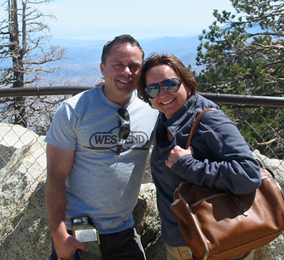 In HistCon, Marcos developed new approaches and materials, exploring the history of medicine and health in contexts of both tropical medicine and HIV/AIDS, writing on historically situated Latino artists and politics in Cuba and the U.S., and finally reaching deeply into the vexed contact and conflict zones joining animal and human being. For his thesis, he planned to draw together philosophy, animal-human studies, and cultural analysis through a sustained close reading of the American philosopher Alphonso Lingis. He emphasized Lingis’ approaches to subjectivity, experience, and history in the face of modern forms of mass killing and many-sided vulnerability and precariousness. In his approach to Lingis, Marcos turned to Husserl, Levinas, Heidegger, Lacan, Kant, and Nietzsche to think through modern encounters with mortality, subjectivity, and responsibility. Cementing my own unwavering desire to be his PhD adviser, Marcos reminded me that Lingis wrote extensively on animals well beyond his recent essay on Nietzsche’s animals: “[Lingis] has also written memorably about real life encounters with, eg., penguins and condors. His thoroughly researched essay, "Quadrille," on bowerbirds is fascinating. He lives with birds that he does not keep in cages but fly free around his domestic space… Indeed, the concept of encounter is crucial to Lingis' work. Lingis travels widely and writes vividly about his encounters, about what moves him, in those travels. It is this primary attention to lived-experience-in-relation that, in my opinion, infuses his philosophical work with freshness. This is especially evident in an extraordinary series of xenographic books like Abuses and Dangerous Emotions, where Lingis puts to work his considerable descriptive powers in ways that powerfully exceed mere theoretical argumentation and technical rhetoric … Lingis' has to be read, that is, the way he uses language must be taken into account, if one is to not only understand what he says but actually to ‘get’ him and his thought” (personal communication, October 10, 2008).
In HistCon, Marcos developed new approaches and materials, exploring the history of medicine and health in contexts of both tropical medicine and HIV/AIDS, writing on historically situated Latino artists and politics in Cuba and the U.S., and finally reaching deeply into the vexed contact and conflict zones joining animal and human being. For his thesis, he planned to draw together philosophy, animal-human studies, and cultural analysis through a sustained close reading of the American philosopher Alphonso Lingis. He emphasized Lingis’ approaches to subjectivity, experience, and history in the face of modern forms of mass killing and many-sided vulnerability and precariousness. In his approach to Lingis, Marcos turned to Husserl, Levinas, Heidegger, Lacan, Kant, and Nietzsche to think through modern encounters with mortality, subjectivity, and responsibility. Cementing my own unwavering desire to be his PhD adviser, Marcos reminded me that Lingis wrote extensively on animals well beyond his recent essay on Nietzsche’s animals: “[Lingis] has also written memorably about real life encounters with, eg., penguins and condors. His thoroughly researched essay, "Quadrille," on bowerbirds is fascinating. He lives with birds that he does not keep in cages but fly free around his domestic space… Indeed, the concept of encounter is crucial to Lingis' work. Lingis travels widely and writes vividly about his encounters, about what moves him, in those travels. It is this primary attention to lived-experience-in-relation that, in my opinion, infuses his philosophical work with freshness. This is especially evident in an extraordinary series of xenographic books like Abuses and Dangerous Emotions, where Lingis puts to work his considerable descriptive powers in ways that powerfully exceed mere theoretical argumentation and technical rhetoric … Lingis' has to be read, that is, the way he uses language must be taken into account, if one is to not only understand what he says but actually to ‘get’ him and his thought” (personal communication, October 10, 2008).
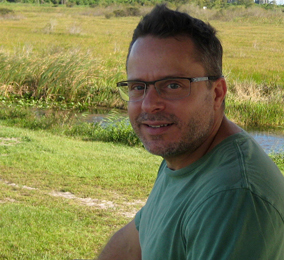 Marcos’ notes show an intense and thorough engagement with the large body of writing by Lingis in order to elucidate core questions about art, species, finitude, temporality, wonder, and ethics. Marcos’ close readings richly embody the intellectual virtues he cultivated and admired—patience, critical acumen, and restraint in the service of genuinely reaching out to what moves us toward something we do not yet know but urgently need. That he was not able to finish this work is a loss to all of us, but a small thing compared to having known the living presence of this man of talent, courage, vulnerability, and accomplishment.
Marcos’ notes show an intense and thorough engagement with the large body of writing by Lingis in order to elucidate core questions about art, species, finitude, temporality, wonder, and ethics. Marcos’ close readings richly embody the intellectual virtues he cultivated and admired—patience, critical acumen, and restraint in the service of genuinely reaching out to what moves us toward something we do not yet know but urgently need. That he was not able to finish this work is a loss to all of us, but a small thing compared to having known the living presence of this man of talent, courage, vulnerability, and accomplishment.
Donna Haraway, May 24, 2011
 Sean, Vaitoa, Teresia: Wellington, 2003.
Sean, Vaitoa, Teresia: Wellington, 2003.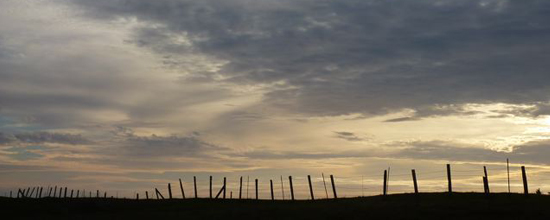




 On May 16, 2011, History of Consciousness graduate student Marcos Becquer died in Boynton Beach, Florida. Born in Jatibonico, Cuba, on October 26, 1965, Marcos was a very special member of the HistCon world, and he is deeply mourned by friends, colleagues, and family. Marcos had a vivid warmth, generous presence, astute mind, and layered sense of humor—online, in person, and in writing. His extraordinary intellectual talent was evident in nuanced scholarship and superb writing in film and visual studies, performance theory, theories of sexuality, philosophy, and critical cultural studies across categories of difference. Coming to History of Consciousness in 2003, Marcos moved to Miami in 2008 to continue his doctoral studies in the midst of the demands of making a living in destructive economic, social, and corporeal times. In Miami he was also close to family, especially his sister Marci Ramos, who supported him in every way. In losing Marcos, we mourn a vital person with a rare intelligence; he risked asking questions close to the heart and rooted in the marrow of the problems of living and dying well in contemporary worlds.
On May 16, 2011, History of Consciousness graduate student Marcos Becquer died in Boynton Beach, Florida. Born in Jatibonico, Cuba, on October 26, 1965, Marcos was a very special member of the HistCon world, and he is deeply mourned by friends, colleagues, and family. Marcos had a vivid warmth, generous presence, astute mind, and layered sense of humor—online, in person, and in writing. His extraordinary intellectual talent was evident in nuanced scholarship and superb writing in film and visual studies, performance theory, theories of sexuality, philosophy, and critical cultural studies across categories of difference. Coming to History of Consciousness in 2003, Marcos moved to Miami in 2008 to continue his doctoral studies in the midst of the demands of making a living in destructive economic, social, and corporeal times. In Miami he was also close to family, especially his sister Marci Ramos, who supported him in every way. In losing Marcos, we mourn a vital person with a rare intelligence; he risked asking questions close to the heart and rooted in the marrow of the problems of living and dying well in contemporary worlds. In HistCon, Marcos developed new approaches and materials, exploring the history of medicine and health in contexts of both tropical medicine and HIV/AIDS, writing on historically situated Latino artists and politics in Cuba and the U.S., and finally reaching deeply into the vexed contact and conflict zones joining animal and human being. For his thesis, he planned to draw together philosophy, animal-human studies, and cultural analysis through a sustained close reading of the American philosopher Alphonso Lingis. He emphasized Lingis’ approaches to subjectivity, experience, and history in the face of modern forms of mass killing and many-sided vulnerability and precariousness. In his approach to Lingis, Marcos turned to Husserl, Levinas, Heidegger, Lacan, Kant, and Nietzsche to think through modern encounters with mortality, subjectivity, and responsibility. Cementing my own unwavering desire to be his PhD adviser, Marcos reminded me that Lingis wrote extensively on animals well beyond his recent essay on Nietzsche’s animals: “[Lingis] has also written memorably about real life encounters with, eg., penguins and condors. His thoroughly researched essay, "Quadrille," on bowerbirds is fascinating. He lives with birds that he does not keep in cages but fly free around his domestic space… Indeed, the concept of encounter is crucial to Lingis' work. Lingis travels widely and writes vividly about his encounters, about what moves him, in those travels. It is this primary attention to lived-experience-in-relation that, in my opinion, infuses his philosophical work with freshness. This is especially evident in an extraordinary series of xenographic books like Abuses and Dangerous Emotions, where Lingis puts to work his considerable descriptive powers in ways that powerfully exceed mere theoretical argumentation and technical rhetoric … Lingis' has to be read, that is, the way he uses language must be taken into account, if one is to not only understand what he says but actually to ‘get’ him and his thought” (personal communication, October 10, 2008).
In HistCon, Marcos developed new approaches and materials, exploring the history of medicine and health in contexts of both tropical medicine and HIV/AIDS, writing on historically situated Latino artists and politics in Cuba and the U.S., and finally reaching deeply into the vexed contact and conflict zones joining animal and human being. For his thesis, he planned to draw together philosophy, animal-human studies, and cultural analysis through a sustained close reading of the American philosopher Alphonso Lingis. He emphasized Lingis’ approaches to subjectivity, experience, and history in the face of modern forms of mass killing and many-sided vulnerability and precariousness. In his approach to Lingis, Marcos turned to Husserl, Levinas, Heidegger, Lacan, Kant, and Nietzsche to think through modern encounters with mortality, subjectivity, and responsibility. Cementing my own unwavering desire to be his PhD adviser, Marcos reminded me that Lingis wrote extensively on animals well beyond his recent essay on Nietzsche’s animals: “[Lingis] has also written memorably about real life encounters with, eg., penguins and condors. His thoroughly researched essay, "Quadrille," on bowerbirds is fascinating. He lives with birds that he does not keep in cages but fly free around his domestic space… Indeed, the concept of encounter is crucial to Lingis' work. Lingis travels widely and writes vividly about his encounters, about what moves him, in those travels. It is this primary attention to lived-experience-in-relation that, in my opinion, infuses his philosophical work with freshness. This is especially evident in an extraordinary series of xenographic books like Abuses and Dangerous Emotions, where Lingis puts to work his considerable descriptive powers in ways that powerfully exceed mere theoretical argumentation and technical rhetoric … Lingis' has to be read, that is, the way he uses language must be taken into account, if one is to not only understand what he says but actually to ‘get’ him and his thought” (personal communication, October 10, 2008). Marcos’ notes show an intense and thorough engagement with the large body of writing by Lingis in order to elucidate core questions about art, species, finitude, temporality, wonder, and ethics. Marcos’ close readings richly embody the intellectual virtues he cultivated and admired—patience, critical acumen, and restraint in the service of genuinely reaching out to what moves us toward something we do not yet know but urgently need. That he was not able to finish this work is a loss to all of us, but a small thing compared to having known the living presence of this man of talent, courage, vulnerability, and accomplishment.
Marcos’ notes show an intense and thorough engagement with the large body of writing by Lingis in order to elucidate core questions about art, species, finitude, temporality, wonder, and ethics. Marcos’ close readings richly embody the intellectual virtues he cultivated and admired—patience, critical acumen, and restraint in the service of genuinely reaching out to what moves us toward something we do not yet know but urgently need. That he was not able to finish this work is a loss to all of us, but a small thing compared to having known the living presence of this man of talent, courage, vulnerability, and accomplishment.